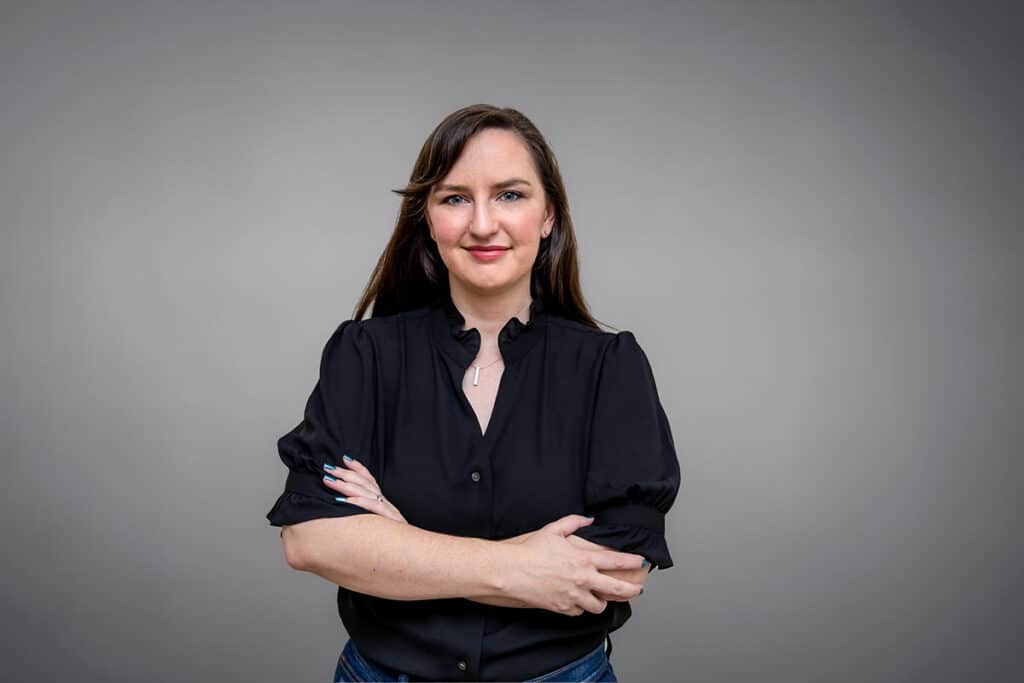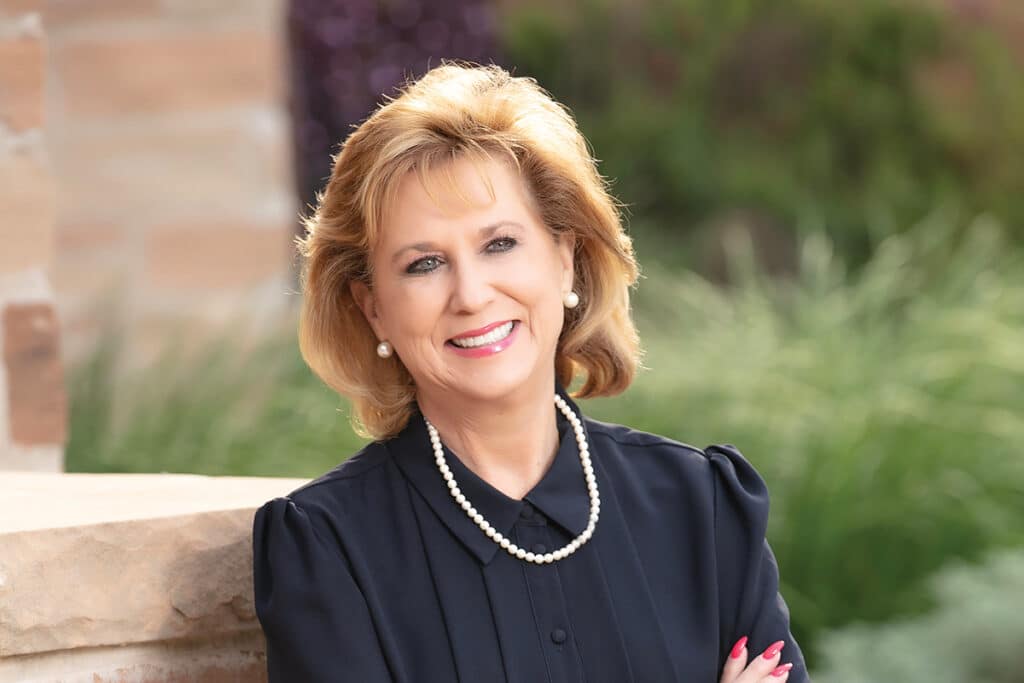Success by Heart
Four women found their way to the exciting profession of mortgage lending by aiming high. Often, inspirational parents or leadership skills developed through sports and sheer tenacity helped lay the groundwork for each of these leaders to earn her way to top positions in the field. And mentoring employees and forging trusted relationships with customers are central to their sustained success.
Kim Kieny was born and raised in San Antonio and graduated from Clark High School and from Texas State University with a BS in psychology and biology. She thought she wanted to be an OB-GYN, but fell into marketing and broadcasting with the San Antonio Spurs.
During her time in marketing, she started working alongside influential people and learned everything she could about their attitude and work ethic. She calls these influential mentors “go” people. For Kieny, these are people who “never give up and never stop.” She wanted to be a person like that. “All I wanted to do was make my parents proud. Whatever their definition of success was, I wanted to embody that definition,” she says.
Kieny moved on to promotions, PR and grant work for Warm Springs Rehabilitation, a division of Methodist Healthcare. There, too, she worked under people who mentored her and saw her drive. She worked with senior leadership people very quickly, in part because she says she didn’t know her place. “Naïveté can be a great thing,” she says, “because it leads to seeing opportunity everywhere.” She has never lost that ability to see and seize opportunity, whatever she’s doing.
In 1999 Kieny joined World Savings, which eventually became Wells Fargo. In 2004, she was offered a region manager role responsible for building a first-of-its-kind origination team supporting bank-referred customers. “I supported the growth and management of several aggressive inbound and outbound call centers.” Though proud of all of her teams, she is most proud of growing the outbound originations team, explaining, “In our first year of production we originated $1 billion. In a year’s time, we did what no team had done prior.”
She gives all the credit to the team:
“A great group came together, stayed focused and made it happen. It was awesome.”
She goes on to say, “I’ve had eight different titles in 16 years with Wells Fargo, but the one honestly that is most powerful to me is the title ‘trusted advisor.’” It best expresses what her actual role is as a mortgage lender who advises, guides and mentors clients and employees, and it is a role she relishes every single day. She says that the key to success as a leader is to “surround yourself with people that you love and trust. When I do that, I know that the people I work with are willing to work just as hard as I am. And that’s how we get the job done.”
The skills she brings to her job she honed playing volleyball and serving as team captain in her youth. She explains, “I was insecure and shy as a child, but in volleyball, in order to succeed, you have to communicate. I wanted to be captain, but that role required that I conquer my shyness.” Earning the role of captain taught her several important lessons. She had to struggle to achieve a goal without hurting someone else’s feelings. She had to learn how to deliver hard messages, pick people up when their performance was lacking and motivate them to be their best. “I had to believe in them more than they believed in themselves.” All of these skills are ones she’s taken with her into the workforce.
Kieny acknowledges there were difficult years during her career where mergers and buyouts seemed all too common and resulted in painful layoff events. She got through those insecure times by building a strong culture of connectivity with her team and co-workers. She had to lay off people, and she had to see people who were friends lose their jobs. But she learned that one can be a leader and a friend. “It is about having open conversations and about being honest,” she says. Her openness is part of her leadership strategy. People who work for her know that she is going to be candid, but they also know she genuinely cares. Her candor and compassion allow her to deliver hard news, but to do so with empathy.
Kieny notes that she “sees women step up more than they ever have.” That trend excites her. “When I first came into mortgage, I was one of two females. We put a strategy in place to recruit more women, and we have been successful,” she says. Her advice to young women seeking a career in her industry is this: “You can’t hold yourself back. The world is ready for you to step up right now.”
Kieny is competitive and driven. But what comes through more than anything else is her empathy—for her employees, for her clients, for her friends and family and for anyone who is just trying their best. She likes to win, but she does so with love.
Susan Stewart, president and CEO of SWBC Mortgage Corporation, speaks very fast, and bubbles over with enthusiasm about her work, her company and about life. Her eyes sparkle with intelligence, wit and an overall optimism about the world. Her authenticity is obvious on first meeting her, as is her kindness. These aren’t qualities you necessarily equate with mortgage lenders, but these very qualities — integrity and kindness — are of first and foremost importance to Stewart. She says that when she’s looking to hire or to train new lenders, she asks the following: “Are you smart? Are you nice? Will you work hard to succeed?” If the answer is yes, she knows that she can turn any young protégé into a success. This is where Stewart spends much of her time lately, grooming new professionals to enter an increasingly expanding business. SWBC Mortgage lends in 34 states, and she is looking to increase that number.
Stewart was born in Fort Worth to an enterprising mother who went to law school after raising four children and to a father who told her in no uncertain terms to reach for the stars: “My father insisted that there was nothing I couldn’t do, and he expected me to set the bar high.” For Stewart, there were no glass ceilings, no jobs that were the purview of men only. She majored in finance, earning her degree from the University of the Incarnate Word. She started, as she says most mortgage lenders do, in an entry-level position doing whatever needed doing. Her career began in mortgage loan operations; she then moved to mortgage operations management and loan production, ultimately managing all aspects of a mortgage operation.
Stewart worked for companies that helped her learn and for others that didn’t appreciate her, but helped her grow as a lender and capitalize on her strengths. She started making loans to new home buyers and committed to her customers that she would work hard to obtain their financing, which she did, allowing her to get most of her subsequent business via word-of-mouth. She jokes, “I wasn’t the best salesperson, but I was tenacious, and I was willing to consistently work hard.”
Stewart credits SWBC for giving her the autonomy to be productive. “When I first came here, they celebrated every success I had, big or small,” she recalls. The fact that the company’s founders trust her means that she feels free to do what she thinks is best, to take risks and even to make mistakes. She explains, “Even if I make a mistake, I know it is my responsibility to resolve it and move on.” She underscores that “kindness and trust are part of the company’s DNA,” and she feels, every day, the push to do her very best. She has done just that. When she joined SWBC Mortgage Corporation, it had three employees. Now there are over 500 employees, and the company has had its best year to date, closing $3 billion in mortgage loans in 2015.
Stewart is sanguine on the future of her industry. She acknowledges the difficulties of the 2008 crash and notes that there were bad actors who made it difficult for honest bankers in the business who were, and still are, trying to help people purchase properties. And she acknowledges many of the federal regulations that have been put in place to ensure that consumers and lenders are protected were necessary. She concedes that the new regulations mean that there are many additional steps in the process, and there will almost certainly be bumps in the road, but in the end, she sees the regulations as something all lenders must comply with to protect borrowers and the mortgage industry.
When asked about what she’d say to young women looking to get into this business, she answers, “Don’t worry about if you like the job, worry about if your employer is pleased with your work. Work hard, and you will succeed. Be completely honest. Change jobs if you are stuck, and keep moving forward.” She is eager to see more women envision themselves in boardrooms. She says that she would tell any young woman, “You might go into a job interview and meet only men in senior executive positions, but there is no reason that you cannot earn one of those positions in the future.” It is clear Stewart believes that the future is very bright.
Linda Rudd has over 20 years of experience in lending. Her home at Legacy Mutual Mortgage is luxuriously decorated in dark woods and rich caramel-colored furnishings that exude a feeling of comfort and competence. Legacy’s best advertising is Linda Rudd herself. She has a unique ability to convey both warmth and competence from the moment you meet her.
Rudd grew up in Texas, first in San Angelo and then in San Antonio, where she has lived since she was 5 years old. She was educated at UTSA and credits a dynamic finance professor, since retired, with guiding her toward banking. “I had thought I wanted to be an accountant,” she says, “but I realized that as much as I loved the numbers, I loved people more. Banking seemed like the right fit.” She moved to Dallas to work for a bank and rose in the ranks very quickly, eventually finding her home at a private banking firm. While there, she became involved in commercial construction loans, and this led to her interest in lending. “What was great about it was working with people on something big, from start to finish,” she says.
Rudd credits her father, who was extremely frugal and structured about money, with teaching her the value of a dollar and cultivating her love of numbers: “Every month he’d sit down with a ledger and pay the bills, and I sat at his knee and watched him. I didn’t grow up with money. I learned the value of it and how money goes out and in — it isn’t magic.” She credits her mother with giving her a strong sense of self-confidence. With such a strong family background and parents who believed in her, Rudd was ready to take on the world at a young age.
In advising young women looking to enter the lending industry, she suggests, “Young women need to find good mentors.” She tells about when she was just entering the business. She mustered up the confidence to call Phyllis Browning, one of San Antonio’s most established and respected realtors, to ask for an informational interview. Browning took that meeting with Rudd and served as an important mentor. Now it is Rudd who seeks to mentor young women and help them find a path in her industry. She advises them to “ask questions, do research, and be willing to work hard.”
Rudd sees no barriers to being a woman in the lending industry and notes that in her firm and in those across the country, the producers are evenly split between men and women.
In discussing the fallout from 2008, Rudd notes that enhanced regulations on lending have been good for the most part in that “the industry has become more consistent.” She says she sees small mom-and-pop operations falling away because they will not be able to afford the layers of employees needed to help with the increased paperwork, but that mid-size and big nationwide firms are here to stay. “There is money to lend,” Rudd says. “You have to be willing to get through the paperwork.”
Angela Guiter grew up in the Rio Grande Valley. Her career path began in earnest when her stepfather offered her a job at a construction company that also handled mortgages. She was hooked on lending on day one. She received her loan officer’s license from Countrywide within three months of starting work. Three years later, she traveled to San Antonio for a movie/getaway weekend with her son. She saw an ad for a job at KB Home and applied that day. She got the job and was back in San Antonio three days later to begin work.
At KB, leads “came flying.” Guiter went from closing five or six loans to closing 35 loans a month. Though she was working 14-hour days, she remembers that time as one of great opportunity and learning, explaining, “Because I was doing so many different kinds of deals, I was learning about every single kind of lending situation.” Her experience at KB was important because it helped her learn how to “overcome obstacles and deal with a lot of first-time homeowners.” She left KB after they sold their mortgage business to Countrywide and Countrywide sold to Bank of America. Once the mortgage arm was being managed by an outfit other than KB, she saw that the business was changing, and it was time for her to make a change too.
Guiter acknowledges that she saw the crash of 2008 coming. Because she worked for a company that was bought by Countrywide, she saw that agents in other parts of the country were giving fast loans to people who, by her estimate, were not solvent enough to pay those loans back. She says that the San Antonio market didn’t experience the same problems that other regions of the country did: “We did not have the cyclical ups and downs that California did, for example. We knew we were going to come out OK, and we were protected because we worked for KB, and KB wasn’t going to make the kinds of loans that other outfits were making.”
Today, as the branch manager of PrimeLending, Guiter spends most of her time mentoring young loan officers. When asked about the new regulations that are aimed at making mortgage lending more transparent to the consumer, she says, “I believe in everything they are trying to do. The point is to give consumers more protection. The only downside is that it has created too much bureaucracy. The intention, which was to make things more transparent, hasn’t really materialized. There is so much paperwork that consumers are still confused. They are being protected, sure, but it is still very difficult for home buyers to understand the documents they are signing.” She expects that things will smooth out in the future, but she does acknowledge that there has been some frustration on both sides because of the new regulations.
Guiter also notes changes in the industry that have resulted from an increase in online loan applications. She comments, “If you can’t keep up with the technology, you are being left behind. Most people don’t want to meet face to face anymore, and this is a face-to-face business.” She says she tries, whenever possible, to hold face-to-face meetings, but it has become more difficult as new homebuyers, particularly younger buyers, prefer to do everything through text or email. She warns that certain outfits that promise “quick” or “fast” loans with online processing only may not be giving consumers the whole story. “Everyone is required to ask for the same paperwork for consumers. And processing that paperwork takes the same amount of time, no matter what outfit you work for. So any lending company that says they are a ‘fast loan’ company is one to watch out for,” she warns.
Guiter advises homebuyers to be informed consumers. “Be patient. It isn’t like the last time you bought a house,” she explains. When looking for a reputable mortgage lender, she offers this advice: “If you don’t have a loan officer you trust, get referrals from real estate agents, and use someone local.”
Guiter’s office is filled with cards and letters she has received from clients who have expressed their gratitude for the work she did to help them buy a home. She says it is a testament to how great the mortgage lending business is. “I can’t imagine a better job,” she exclaims. “There is no greater reward than seeing the joy on a client’s face when you give them keys to their first home.” She can’t imagine doing anything else for a living. She’s exactly where she’s supposed to be.
By Jennifer Bartlett
Photography by Elizabeth Warburton




